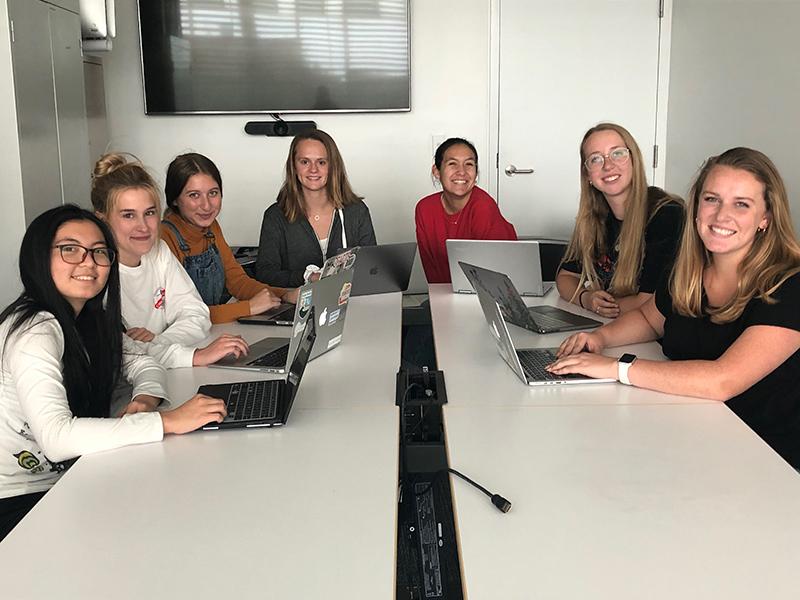Newcomb Institute Technology Showcase addresses gender gap in STEM
The global demand for technology careers is quickly outpacing supply, yet women and minorities remain largely underrepresented in tech, both on college campuses and in the workplace.
The World Economic Forum’s 2016 Global Gender Gap Report reveals that only 16% of all female students graduate with science, technology, engineering and mathematics (STEM) degrees, in contrast to 30% of all male students. Increasing women's participation in STEM careers has the power to boost women's cumulative earnings by an estimated $299 million, expediting global economic development.
The gender gap in STEM is one of many topics addressed in Newcomb Institute’s Technology Showcase, a student-produced digital symposium of tech-related projects completed during the 2019-2020 school year.
The showcase is the culmination of digital research and information technology internships completed through the Newcomb Technology Initiatives Program. Whether through hands-on coding and design experience, troubleshooting IT issues on campus or networking at the annual Grace Hopper Technology conference, the program provides Tulane students with the skills needed to excel in technology careers.
Modeled after the organizational structure of tech firms and led by Jacquelyne Thoni Howard, PhD, the Technology Initiatives Program provides students with relevant experience in a collaborative environment. Digital Research Interns (DRI) work together on digital scholarship projects submitted by Tulane faculty from a variety of disciplines and departments. The interns work in teams, balancing multiple projects and shared responsibilities.
“By creating opportunities for students to learn and gain experience with a program that mimics the technology industry, Dr. Howard has created a pathway for students to gain industry internships and ultimately industry jobs,” said senior Adelaide Jasica, who served as the DRI product developer and liaison between Tulane faculty and the DRI team.
DRI students designed interactive, animated microeconomic graphs to be used as teaching aids for economics professor Toni Weiss, analyzed and processed New Orleans voter turnout data for politics professor Mirya Holman, PhD, and developed a website to host a database of letters written between Americans and Africans during decolonization for history professor Elisabeth McMahon, PhD.
“The Digital Research Internship Program has given me so much – meaningful projects, industry standard tools, frameworks, projects and experiences to learn from and talk about during [job] interviews,” said Jasica, who graduated this spring with a degree in computer science and public health and will accept a job at Discover.
Newcomb’s Information Technology interns are responsible for troubleshooting tech issues on campus, managing technology assets, providing IT customer service and classroom support, and completing special interest research projects.
Senior Anne Grotjan conducted research analyzing the content of memes made by Tulane students.
“These memes have underlying messages that are sent out through the Tulane body, and are created content by Tulane students…they give you a great idea of what’s going on on campus and general feelings towards certain groups,” Grotjan said.
Her project ran thousands of Tulane-related memes through the programming language R, which analyzed the frequency of gendered words. Grotjan and the other interns present their projects in video briefs and in zine format available for download.
The showcase highlights the diversity of the student research projects, ranging from actress Hedy Lamar’s invention of frequency hopping, the experience of Jewish women working at tech corporations, and the effects of biased algorithms in major search engines.
This diversity of thought further reinforces the need for greater diversity in the tech world.
“Addressing the gender gap in STEM starts with building intentional communities on campus through internship programs, grant opportunities and student groups,” said Howard, who leads Newcomb Institute’s Technology Initiatives Program as administrative assistant professor of Technology and Women's History.
“Newcomb Institute’s STEM programming is open to all tech-minded undergraduates. We are building a technology community that supports the technical work of gender minorities and allies with a variety of feminist epistemological frameworks,” said Howard. “To this end, we focus on interdisciplinary collaboration within our programs, allowing STEM students to apply their advanced technical skills to humanities-based questions and real-world problems. At the same time, our programs help demystify technology for Liberal Arts students looking to learn technical skills and expand their career options,” said Howard.
The Newcomb Technology Initiatives program encourages Tulane faculty, staff, graduate students and community members to submit proposals for digital projects for the 2020-2021 school year.

